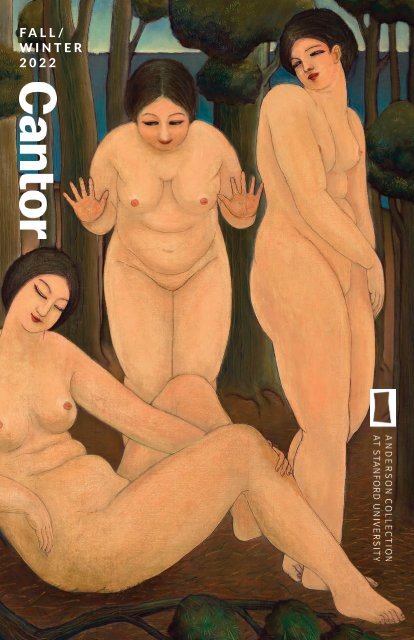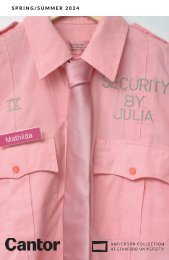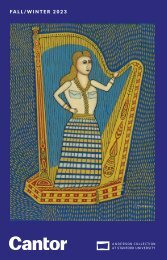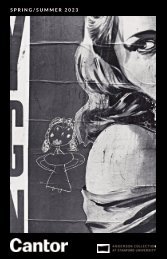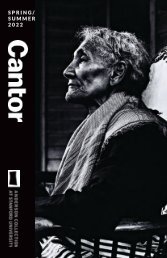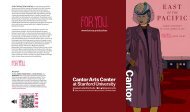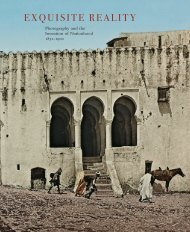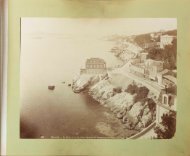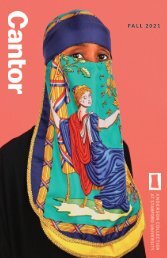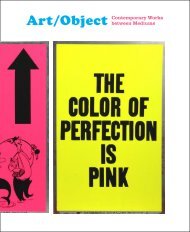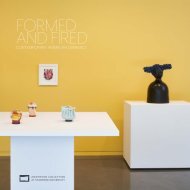Cantor Arts Center & Anderson Collection Magazine | Fall - Winter 2022
- No tags were found...
You also want an ePaper? Increase the reach of your titles
YUMPU automatically turns print PDFs into web optimized ePapers that Google loves.
FALL/<br />
WINTER<br />
<strong>2022</strong>
NEW AT THE ANDERSON COLLECTION<br />
Stephanie Syjuco: White Balance/Color Cast SEP. 18, <strong>2022</strong>–MAR. 5, 2023<br />
Stephanie Syjuco, Whiteout (Krylon ColorMaster Gloss White on White Oriental Lillies) in the series<br />
“Hard Light,” 2019. Pigmented inkjet print. Edition of 5 + 2AP. Courtesy of the artist, Catharine Clark<br />
Gallery, San Francisco, and RYAN LEE Gallery, New York
FALL/WINTER <strong>2022</strong><br />
5 WHAT’S NEW AT THE CANTOR<br />
The Marmor <strong>Collection</strong>: Color as Form in<br />
Prints, 1953–1971, through NOV. 27, <strong>2022</strong><br />
At Home/On Stage: Asian American<br />
Representation in Photography and Film,<br />
through JAN. 15, 2023<br />
6–7 EXHIBITION SPOTLIGHT<br />
East of the Pacific: Making Histories of Asian<br />
American Art, SEP. 28, <strong>2022</strong>–FEB. 12, 2023<br />
8–9 WHAT’S NEW AT THE ANDERSON<br />
Stephanie Syjuco: White Balance/Color Cast,<br />
SEP. 18, <strong>2022</strong>–MAR. 5, 2023<br />
New Acquisition: Eamon Ore-Giron,<br />
Infinite Regress CLXXXIII<br />
10 THINGS TO DO<br />
Art For All: Family Day, OCT. 16, <strong>2022</strong><br />
PAGE 5<br />
The Marmor <strong>Collection</strong>: Color as Form in Prints, 1953–1971<br />
Sonia Delaunay (French, born in Russia, 1885–1979),<br />
Color Rhythm (Rhythme Coloré), 1953. Pochoir. <strong>Cantor</strong><br />
<strong>Arts</strong> <strong>Center</strong>, Stanford University. Gift of the Marmor<br />
Foundation (Drs. Michael and Jane Marmor) from the<br />
collection of Drs. Judd and Katherine<br />
Marmor, 2006.98<br />
Symposium: IMU UR2: Art, Aesthetics,<br />
and Asian America Asian America,<br />
OCT. 28–29, <strong>2022</strong><br />
11 COMING TO THE CANTOR<br />
A Change of Scenery: Photographs of Leisure<br />
in the Landscape, FEB. 8–JUL. 16, 2023<br />
Reality Makes Them Dream: American<br />
Photography, 1929–1941, MAR. 29–<br />
JUL. 30, 2023<br />
PAGE 6–7<br />
East of the Pacific: Making Histories of Asian American Art<br />
Tokio Ueyama (American, born in Japan, 1889–1954),<br />
Monterey Cove, 1924. Oil on canvas. <strong>Cantor</strong> <strong>Arts</strong> <strong>Center</strong>,<br />
Stanford University. The Michael Donald Brown<br />
<strong>Collection</strong>, made possible by the William Alden Campbell<br />
and Martha Campbell Art Acquisition Fund and the Asian<br />
American Art Initiative Acquisitions Fund, 2020.129<br />
COVER IMAGE: George Matsusaburo Hibi (American, born<br />
in Japan, 1886–1947), Three Muses, 1930. Oil on canvas.<br />
<strong>Cantor</strong> <strong>Arts</strong> <strong>Center</strong>, Stanford University. The Michael<br />
Donald Brown <strong>Collection</strong>, made possible by the William<br />
Alden Campbell and Martha Campbell Art Acquisition<br />
Fund and the Asian American Art Initiative Acquisitions<br />
Fund, 2020.54<br />
PAGE 9<br />
Symposium: IMU UR2: Art, Aesthetics, and Asian America<br />
OCT. 28–29, <strong>2022</strong><br />
Miki Hayakawa (American, born in Japan, 1899–1953)<br />
Sleeping Man, 1926. Oil on canvas. <strong>Cantor</strong> <strong>Arts</strong> <strong>Center</strong>,<br />
Stanford University. The Michael Donald Brown<br />
<strong>Collection</strong>, made possible by the William Alden Campbell<br />
and Martha Campbell Art Acquisition Fund and the<br />
Asian American Art Initiative Acquisitions Fund. Funding<br />
for the conservation of this artwork was generously<br />
provided through a grant from the Bank of America Art<br />
Conservation Project, 2020.48<br />
3<br />
TABLE OF CONTENTS
WELCOME<br />
4<br />
On July 5, Veronica Roberts joined the <strong>Cantor</strong> as the John and<br />
Jill Freidenrich Director after serving as curator of modern<br />
and contemporary art at the Blanton Museum of Art at The<br />
University of Texas at Austin. Roberts joins the <strong>Cantor</strong> in the<br />
middle of a busy year of returning, rebuilding, and reimagining<br />
at the museum during the evolving pandemic. First up for the<br />
new director is meeting staff and volunteers and overseeing the<br />
opening of two Asian American art exhibitions and a related<br />
two-day public symposium featuring a keynote conversation<br />
with poet Cathy Park Hong, artist Jen Liu, and AAAI co-founder<br />
Marci Kwon. This fall Roberts and Jason Linetzky, director of<br />
the <strong>Anderson</strong> <strong>Collection</strong>, presided over Museums by Moonlight<br />
and look forward to Art for All: Family Day, two signature events<br />
for the museums that bring the arts community together. Read<br />
on to find out more about what’s happening at the museums.<br />
Photo Andrew Brodhead
The Marmor <strong>Collection</strong>: Color<br />
as Form in Prints, 1953–1971<br />
Through NOV. 27, <strong>2022</strong><br />
Pigott Family Gallery—142<br />
This collection rotation of<br />
American and British prints drawn<br />
from the Marmor <strong>Collection</strong> at<br />
the <strong>Cantor</strong> <strong>Arts</strong> <strong>Center</strong> highlights<br />
abstract works from the early<br />
1950s to the ’70s that explore the<br />
relationship between color and<br />
form. Artists represented include<br />
Sonia Delaunay, Sam Francis,<br />
Allen Jones, Ellsworth Kelly, and<br />
Frank Stella.<br />
We gratefully acknowledge support from the Marmor<br />
Foundation Gift Fund. IMAGE: Allen Jones (English, born<br />
in 1937), Untitled from Life Class, 1968. Lithograph.<br />
<strong>Cantor</strong> <strong>Arts</strong> <strong>Center</strong>, Stanford University. Gift of the<br />
Marmor Foundation (Drs. Michael and Jane Marmor)<br />
from the collection of Drs. Judd and Katherine Marmor,<br />
2006.101.6.a-b<br />
At Home On Stage: Asian<br />
American Representation in<br />
Photography and Film<br />
Through JAN. 15, 2023<br />
Ruth Levison Halperin Gallery—211<br />
This exhibition of 20th-century<br />
photography, film, and video<br />
explores how Asian American<br />
artists’ work participates in<br />
sociocultural efforts toward<br />
self-definition. At Home/<br />
On Stage features moving<br />
depictions of the private family<br />
lives of Asian Americans and<br />
conceptual visual rebuttals<br />
to the problematic history of<br />
Asian American representation<br />
in American culture. This<br />
exhibition is part of the Asian<br />
American Art Initiative (AAAI).<br />
We gratefully acknowledge support from the Halperin Exhibitions Fund. IMAGE: Gloria Wong (Canadian, born in 1998), Ngan,<br />
2020. Archival pigment print. <strong>Cantor</strong> <strong>Arts</strong> <strong>Center</strong>, Stanford University. Gift of the artist in support of the Asian American Art<br />
Initiative, 2021.132<br />
5<br />
WHAT’S NEW AT THE CANTOR
SEP. 28, <strong>2022</strong>–FEB. 12, 2023<br />
Freidenrich Family Gallery—221<br />
This exhibition asks: what it<br />
would mean to consider<br />
a history of the United<br />
States as one of Eastern<br />
expansion from Asia? How<br />
might we reorient our<br />
understanding of what<br />
constitutes Asian, and<br />
what constitutes American,<br />
through looking at artists<br />
who worked between these<br />
worlds? This exhibition<br />
argues that the continental<br />
United States’ western<br />
coast was—and continues<br />
to be—fundamentally shaped by its interactions with Asia, which is<br />
especially evident in its artistic production. Though long overlooked<br />
by mainstream art institutions, Asian diasporic artists have helped<br />
shape and advance the course of American art, serving as vanguards,<br />
teachers, and activists within their communities and beyond.<br />
Works in East of the Pacific<br />
were acquired from a variety of<br />
sources. A significant percentage<br />
of the objects presented came<br />
from the estate of Michael Donald<br />
Brown, a Bay Area arts dealer<br />
and collector who amassed an<br />
unparalleled collection of pre-<br />
1950 Asian Californian art. Many<br />
gifts of art reflect the generosity<br />
and support of larger Bay Area arts and AAPI communities: living<br />
artists, historic artists’ estates, Japanese incarceration survivors, and<br />
6
contemporary art collectors all contributed<br />
to this exhibition. The provenance of these<br />
objects tells stories about how Asian<br />
American art has been created, cared for,<br />
and preserved—demonstrating that historymaking<br />
is an active and ongoing process.<br />
Curated by assistant curator of American<br />
Art, Aleesa Pitchamarn Alexander, she<br />
said, “This exhibition is a testament to the power of community<br />
and collaboration. It is dedicated to the artists represented and<br />
their families, as well as important foundational figures to the<br />
history of Asian American art, like scholars Mark Dean Johnson<br />
and Gordon Chang. Without their support, Marci Kwon and<br />
I would not be able to do the work of the Asian American Art<br />
Initiative.” Alexander continues, “East of the Pacific just scratches<br />
the surface of Asian American art history. Not all Asian diasporas<br />
are equitably represented. There is much to celebrate here, but<br />
working on this exhibition has made clear to me just how much<br />
more there is to do.”<br />
Artists represented in the exhibition include Toshio Aoki<br />
(Japanese, active in U.S.A., 1854–1912), Bernice Bing (American,<br />
1936–1998), Chiura Obata (American, born in Japan, 1885–<br />
1975), Toshiko Takaezu (American, 1922–2011), Carlos Villa<br />
(American, 1936–2013), Martin Wong (American, 1946–1999),<br />
and Jade Fon Woo (American, 1911–1983). To accompany the<br />
exhibition, the Asian American artist performance collective For<br />
You, was commissioned to create<br />
a series of original audio tours.<br />
We gratefully acknowledge support from the Robert Mondavi<br />
Family Fund, the Terra Foundation for American Art, Pamela<br />
and David Hornik, and the Bank of America Art Conservation<br />
Project. IMAGES: Bernice Bing (American, 1936–1998),<br />
Blue Mountain No. 4, 1966. Oil and acrylic on canvas. Gift of<br />
Alexa Young. Funding for the conservation of this artwork<br />
was generously provided through a grant from the Bank of<br />
America Art Conservation Project, 2020.14 • Chiura Obata<br />
(American, born in Japan, 1885–1975), Tanforan, Mr. S.<br />
Yamamoto, Mr. M. Kimbara First Vegetable Raised, 1942. Ink<br />
on paper. Gift of the Estate of Chiura Obata in support of<br />
the Asian American Art Initiative, <strong>2022</strong>.29 • Toshiko Takaezu<br />
(American, 1922–2011), #8, c. 1990s. Stoneware with glazes.<br />
Gift of the artist, 2008.230 • Jade Fon Woo (American,<br />
1911–1983), Lanterns-S.F. Chinatown, c. 1943–1949.<br />
Watercolor on paper. The Michael Donald Brown <strong>Collection</strong>,<br />
made possible by the William Alden Campbell and Martha<br />
Campbell Art Acquisition Fund and the Asian American Art<br />
Initiative Acquisitions Fund, 2020.146. All images: <strong>Cantor</strong><br />
<strong>Arts</strong> <strong>Center</strong>, Stanford University<br />
7<br />
EXHIBITION SPOTLIGHT
Stephanie Syjuco: White<br />
Balance/Color Cast<br />
SEP. 18, <strong>2022</strong>–MAR. 5, 2023<br />
Wisch Family Gallery<br />
Utilizing photography,<br />
video, installation, and social<br />
practice, artist and educator<br />
Stephanie Syjuco interrogates<br />
the construction of American<br />
history and foregrounds<br />
its colonial practices. She<br />
is a tireless researcher<br />
of national archives who,<br />
through examination and<br />
appropriation, questions<br />
the neutrality of images and<br />
counters existing power<br />
structures. Dedicated to<br />
repositioning narratives<br />
and constructing new ones,<br />
Syjuco asks her viewers to<br />
shift their perspectives and<br />
critically engage in creative<br />
acts of inclusion.<br />
WHAT’S NEW AT THE ANDERSON<br />
White Balance/ColorCast<br />
derives from Syjuco’s<br />
established interest in<br />
photographic imaging<br />
standards, color calibration<br />
charts, and photography’s<br />
suggestive powers. The commonly used<br />
term, white balance, refers to the process<br />
of removing an image’s color cast, shifting<br />
the image to what could be considered a<br />
more “neutral” or accurate representation.<br />
In Syjuco’s case, she uses these traditional<br />
imaging terms to question how<br />
photography and imaging standards—such<br />
as the quest for “correct” color—reflect<br />
deep-seated biases, positioning whiteness<br />
as its center.<br />
8
Born in the Philippines in 1974,<br />
Syjuco earned a BFA from the San<br />
Francisco Art Institute in 1995 and<br />
an MFA from Stanford University in<br />
2005. She is the recipient of a 2014<br />
Guggenheim Fellowship Award, a<br />
2009 Joan Mitchell Painters and<br />
Sculptors Award, and a 2020 Tiffany<br />
Foundation Award.<br />
We gratefully acknowledge support from Pamela and David<br />
Hornik. ALL IMAGES: Stephanie Syjuco: Cargo Cults: Head Bundle<br />
(Small), 2016. Pigmented inkjet print. Edition of 15 + 2AP •<br />
Orange Alert (Fluorescent Orange on White Tulips) in the series<br />
“Hard Light,” 2019. Pigmented inkjet print. Edition of 3 + 2AP •<br />
Pileup (Eastman), 2021. Hand-assembled pigmented inkjet prints<br />
on Hahnemuhle Baryta. Edition 3 + 2AP • Installation shot of<br />
Block Out the Sun, 2021. Single-channel video with sound. Edition<br />
of 3 +2AP. Photo: John Janca. ALL IMAGES: Courtesy of the artist,<br />
Catharine Clark Gallery, San Francisco, and RYAN LEE Gallery,<br />
New York<br />
New Acquisition: Infinite Regress CLXXXIII<br />
The <strong>Anderson</strong> <strong>Collection</strong> was honored to present an exhibition of Eamon<br />
Ore-Giron’s paintings in the fall of 2021 and is excited to continue sharing his<br />
voice and work with the community by acquiring Infinite Regress CLXXXIII, 2021,<br />
for the museum’s permanent collection. Ore-Giron’s work draws on motifs<br />
from indigenous and craft traditions, such as Amazonian tapestries and pre-<br />
Colombian goldwork, alongside aesthetics from 20th-century avant-gardes.<br />
Moving between temporalities and across cultural contexts, his large-scale<br />
abstract geometric paintings manifest a history of transnational exchange. We<br />
extend our deep gratitude to all who made this acquisition possible.<br />
IMAGE: Installation<br />
view, Eamon Ore-<br />
Giron, Infinite Regress<br />
CLXXXIII, 2021, flashe<br />
and mineral paint<br />
on linen, <strong>Anderson</strong><br />
<strong>Collection</strong> at Stanford<br />
University. Gift of<br />
Pamela and David<br />
Hornik with generous<br />
support from the<br />
Harry W. and Mary M.<br />
<strong>Anderson</strong> Charitable<br />
Foundation, Andi<br />
Okamura and Jeff<br />
Chambers, Leslie and<br />
Kenneth Heisz, Mary<br />
Patricia <strong>Anderson</strong><br />
Pence, and Kathryn<br />
and Thomas Wiggans,<br />
<strong>2022</strong>.1<br />
9
Art for All: Family Day<br />
OCT. 16, <strong>2022</strong>, 11 AM–4 PM<br />
Celebrate art and family with a<br />
day of art-making and engaging<br />
performances on the lawn<br />
between the <strong>Cantor</strong> and the<br />
<strong>Anderson</strong> <strong>Collection</strong>. Free<br />
registration is required at<br />
https://stanford.la/3Rwv8Wi<br />
Family Day is made possible through<br />
the generous support of the Hohbach<br />
Family Fund<br />
Symposium: IMU UR2: Art,<br />
Aesthetics, and Asian America<br />
OCT. 28–29, <strong>2022</strong><br />
Organized by the Asian American Art Initiative<br />
(AAAI) and the Stanford <strong>Arts</strong> Incubator,<br />
this two-day symposium will bring together<br />
artists, curators, and academics to rethink and<br />
reimagine the histories and futures of artists of<br />
Asian descent.<br />
The title of the symposium, IMU UR2 is a phrase<br />
coined by the painter Martin Wong, who lived<br />
in San Francisco and New York. Phonetically<br />
reading “I am you, you are two/too/to,” it captures the imagination,<br />
playfulness, and conceptual depth of Wong’s work. Here, the self is<br />
not singular but made in relation to others, who are likewise made<br />
in relation to us. The phrase encapsulates the symposium’s aim of<br />
thinking through the myriad ways Asian/Americans, and the work they<br />
create, are at once connected and distinctive.<br />
THINGS TO DO<br />
The symposium panels are titled Global Intimacies, Race and Aesthetics,<br />
Art & Activisms, History & Memory, Gender and Sexuality, and Institutional<br />
Interventions, and they will be followed each day by a reception. The<br />
event will conclude with a keynote conversation at Bing Concert<br />
Hall between Cathy Park Hong , author and poet; Jen Liu, artist; and<br />
Marci Kwon, co-director of the Asian American Art Initiative. Free and<br />
open to the public, the symposium will also be live-streamed. Check<br />
the museum website (museum.stanford.edu) for more information,<br />
including RSVP instructions.<br />
IMAGE: Martin Wong (American, 1946–1999), Chinatown Dragon, 1993. Acrylic on canvas. <strong>Cantor</strong> <strong>Arts</strong> <strong>Center</strong>, Stanford<br />
University. Gift of The Martin Wong Foundation, 2019.202<br />
10
A Change of Scenery:<br />
Photographs of Leisure in the<br />
Landscape<br />
FEB. 8–JUL. 16, 2023<br />
Ruth Levison Halperin Gallery—211<br />
This exhibition surveys ways<br />
of “being” in the landscape,<br />
encompassing common activities<br />
like sightseeing, recreation, and<br />
play, and affective states like joy,<br />
intimacy, affinity, and belonging.<br />
Displaying approximately 55<br />
American photographs from the<br />
19th and 20th centuries from the<br />
<strong>Cantor</strong>’s collection featuring people<br />
in various outdoor public spaces, this<br />
single-gallery exhibition considers the importance of access to nature<br />
and leisure, what access entails, and how it shapes identity.<br />
We gratefully acknowledge support from the Halperin Exhibitions Fund. IMAGE: Robert Frank (American, born in<br />
Switzerland, 1924–2019), Couple with Child Sleeping in Woods, c. 1950. Gelatin silver print. <strong>Cantor</strong> <strong>Arts</strong> <strong>Center</strong>, Stanford<br />
University. © Andrea Frank Foundation. Gift of Raymond B. Gary, 1984.493.94<br />
Reality Makes Them Dream:<br />
American Photography,<br />
1929–1941<br />
MAR. 29–JUL. 30, 2023<br />
Freidenrich Family Gallery—221<br />
This exhibition features works<br />
created in the 1930s by five<br />
artists in the Capital Group<br />
Foundation Photography<br />
<strong>Collection</strong>: Ansel Adams,<br />
John Gutmann, Helen<br />
Levitt, Wright Morris, and<br />
Edward Weston. Displayed<br />
among a diverse selection<br />
of photographs by their<br />
contemporaries, this material<br />
illuminates how American<br />
artists used photography to<br />
spark the imagination.<br />
We gratefully acknowledge support from The Capital Group Foundation Photography <strong>Collection</strong> Fund and the Kazak<br />
Acquisitions and Exhibitions Fund. IMAGE: Wright Morris (American, 1910–1998), Gano Grain Elevator, Western Kansas,<br />
1940. Gelatin silver print. © Estate of Wright Morris. Courtesy of the <strong>Center</strong> for Creative Photography. <strong>Cantor</strong> <strong>Arts</strong><br />
<strong>Center</strong>. The Capital Group Foundation Photography <strong>Collection</strong> at Stanford University, 2019.46.12<br />
11<br />
COMING TO THE CANTOR
328 Lomita Drive<br />
Stanford, CA 94305-5060<br />
NONPROFIT<br />
ORGANIZATION<br />
U.S. POSTAGE<br />
PAID<br />
PALO ALTO CA<br />
PERMIT NO. 28<br />
Art for All: Family Day<br />
OCT. 16, 11 AM–4 PM<br />
Celebrate art and family with a day of<br />
art-making and engaging performances<br />
on the lawn between the <strong>Cantor</strong><br />
and the <strong>Anderson</strong> <strong>Collection</strong>. Free<br />
registration is required.<br />
https://stanford.la/3Rwv8Wi<br />
Family Day is made possible through the generous<br />
support of the Hohbach Family Fund<br />
We appreciate your support! museum.stanford.edu/support


